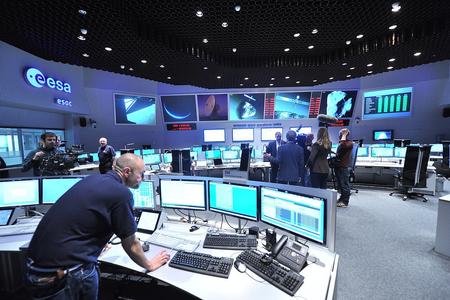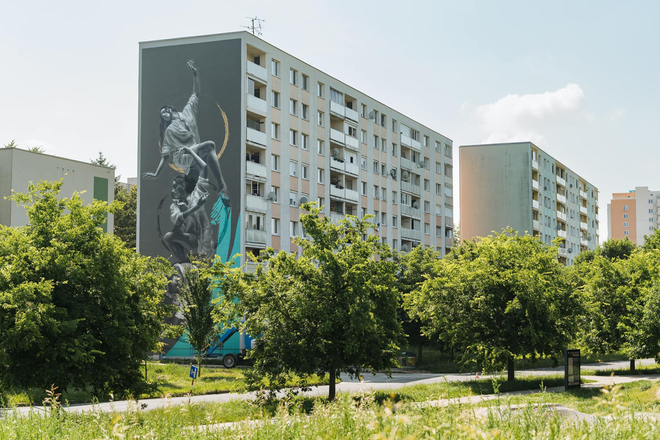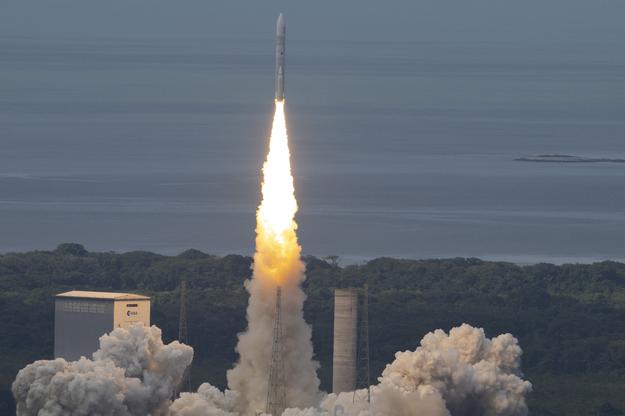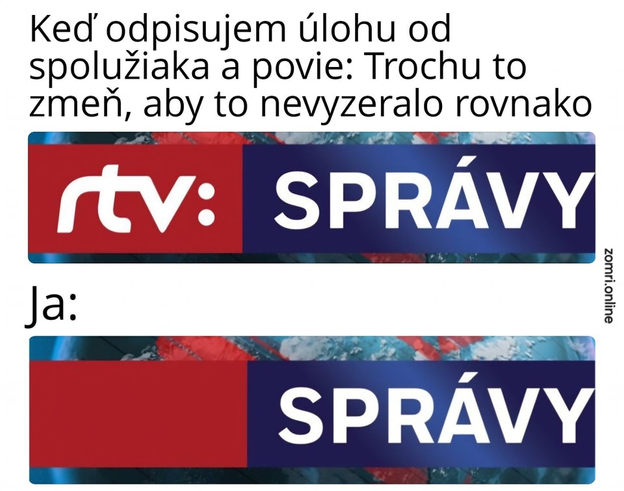Every week The Slovak Spectator brings you a selection of three short stories from across Slovakia from which pessimism and negativity are absent.
A world-class mural in Trnava
A special new mural now adorns a block of flats in Trnava.
Situated on Ludvika van Beethovena Street, it was created by renowned Dutch visual and graffiti artist Judith de Leeuw, known as JDL. It took six days to complete.
“The painting shows a woman enclosed in a circle at the bottom, breaking it into pieces, and emerging from her bubble at the top,” de Leeuw wrote on Instagram. “It explores polarisation and how people live in isolated realities.”
She explained that during time spent in America, she learned that meeting different people can dissolve tensions and foster unexpected friendships.
“In Slovakia’s current situation, this mural reminds us that breaking out of our bubbles and engaging with others can lead to unity and understanding,” the artist added.
De Leeuw is regarded as one of the world's leading street artists, and has created artworks in 41 countries, participating in various art projects across the globe. Her works often explore topics related to social differences and inequality, the TASR newswire reported.
Slovak nanosatellite will hunt gamma rays
Slovakia has sent its fourth satellite into space.
The GRBBeta nanosatellite is supposed to validate technology for the future constellation of CAMELOT nanosatellites, which will be used to record and accurately locate gamma-ray bursts from space, and offer services to amateur radio operators. The project was prepared by the Faculty of Aeronautics of the Technical University of Košice (TUKE), in cooperation with various foreign institutions, including universities in Canada, Hungary, Czechia and Japan, and with financial support from the Slovak Education Ministry. The satellite platform was supplied by the Slovak company SpaceManic.
A team of scientists has already made contact with GRBBeta, which is a 2U CubeSat satellite (a class of small satellite – Ed. note) whose dimensions in its folded state (without deployed antennas) are just 10cm x 10cm x 22.7cm.

“From the moment the connection was established, the functionality of individual subsystems of the satellite was checked, such as opening of antennas, battery status and charging, satellite temperature, functioning of solar panels, camera cooler effectiveness, and so on,” said Peter Hanák of TUKE, as quoted by the TASR newswire. The satellite's GPS and GRB detector were activated successfully, while other systems and necessary measurements will be added in the coming days, he noted.
Gamma ray bursts (GRBs) are rare, ultra-large explosions described as the most explosive events in the entire universe. Fortunately for us, they do not typically occur in our own galaxy, the Milky Way.
The satellite was taken into space on board the new Ariane 6 spacecraft, after receiving a free ticket from the European Space Agency (ESA) back in October 2022, when Slovakia joined the agency. This made the country more visible, and even saved some costs related to launching the satellite into orbit, the Education Ministry commented. Minister Tomáš Drucker (Hlas) called it “an important milestone for Slovak space research”.
The magical meadow hidden away in northern Slovakia
The village of Oščadnica, situated in the Kysuce region in northern Slovakia, hides a unique spot that has become a favourite among Slovaks and tourists from abroad.
Čarovná Lúka (Magical Meadow) spreads across a total of 8,000 square metres and is divided into several sectors. Each of these contains different colours and different scents of plants and flowers. Among other plants, there are poppies, colourful honey flowers and various herbs at the site. There is also a lavender field where seasonal lavender picking is held.
Visitors can stroll around the meadow, but also learn more about various herbs and take pictures, using various props that can be found there.
“The main aim is that people relax here, enjoy the beauty of the colours, the scent of plants and, of course, take a nice picture with their family in the beautiful surroundings of Kysuce,” reads the website.
Five feel-good stories published by The Slovak Spectator to read:
Chemist Yaroslava Lopushanska had a good career in Ukraine, but left for Slovakia where she currently works in a grocery shop. She thinks about her home in Uzhhorod all the time, but knows she is better off in Slovakia.
In “Slovak Settlers”, two writers join forces to bring the Slovak immigrant experience to life through the family stories of Slovak descendants.
A searing political pamphlet in novel form, “The Taste of Power” has transcended its era, becoming required reading in Slovak schools and a mirror on politicians wielding authority today.
Some Slovak villages have the right idea for attracting tourists, while the others sound like they do not really want to have tourists at all.
Tennis player Lulu Sun, who was born in New Zealand to a Chinese mother and Croatian father, has made it to the quarter-finals of Wimbledon. Her team is led by Slovak coach Vladimír Pláteník.
Political meme of the week
Caption: “When I’m copying homework from my classmate: Change it a bit so that it doesn’t look the same.” “Me: [the picture below].”
The satirical site Zomri.online has published several memes mocking the recent temporary change in logo by the main news programme of the public-service broadcaster. After a new law on public broadcasting became effective on July 1, following its rapid approval by President Peter Pellegrini, what was RTVS became STVR overnight – but no one had thought to prepare new logos or jingles. Several employees of the broadcaster, which has been designed by the government as more of state-directed organ than a public-service broadcaster, called the first days of STVR "chaos". The Culture Ministry in the meantime purchased new logos for both the television and radio departments, but these have yet to be revealed.
You can send me your tips on good news stories about Slovakia or funny memes at: radka.minarechova@spectator.sk. Thank you!


 Judith de Leeuw's 'Beyond the Mind Boundaries' mural can be viewed in Trnava, on Ludvika van Beethovena Street. (source: Matúš Koprda)
Judith de Leeuw's 'Beyond the Mind Boundaries' mural can be viewed in Trnava, on Ludvika van Beethovena Street. (source: Matúš Koprda)
 The new Ariane 6 rocket launching from Kourou, French Guiana, on July 9, 2024. (source: AP/TASR)
The new Ariane 6 rocket launching from Kourou, French Guiana, on July 9, 2024. (source: AP/TASR)
 (source: Facebook/Zomri)
(source: Facebook/Zomri)